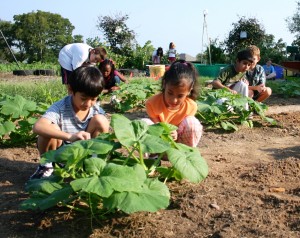AgriLife Extension’s Texas Grow! Eat! Go! program receives top award for diversity
COLLEGE STATION – The Texas Grow! Eat! Go! program of the Texas A&M AgriLife Extension Service has received the National Extension Diversity Award from a national Cooperative Extension association and the U.S. Department of Agriculture’s National Institute of Food and Agriculture.

The program is a five-year collaboration among AgriLife Extension, the University of Texas School of Public Health, Texas A&M University and the Texas A&M Health Science Center School of Public Health. The goal is to improve the physical activity and eating behaviors of children and families, especially in low-income and underserved areas.
The award will be presented during the annual meeting of the Association of Public and Land-grant Universities Nov. 15-17 in Indianapolis.
According to the USDA-NIFA, the National Diversity Award recognizes an Extension program exhibiting significant contributions and accomplishments in achieving and sustaining diversity and pluralism.
“The primary goal of the program is to help combat youth obesity by reversing unhealthy weight trends and influencing youth to develop better eating habits and be more active,” said Dr. Susan Ballabina, AgriLife Extension associate director for program development, College Station.
The Texas Grow! Eat! Go! program was implemented at 28 Title I elementary schools in five counties in order to develop a complete research study of its efficacy, said Dr. Judy Warren, AgriLife Extension special initiatives coordinator and chair for the Texas Grow! Eat! Go! program.
“We’ve just finished collecting final data in this research study, which includes input from 1,508 children and 1,169 parents,” Warren said.
Those providing program support have included AgriLife Extension agents for horticulture, family and consumer sciences, urban youth development and 4-H youth development, as well as employees of the agency’s Expanded Food and Nutrition Education and Better Living for Texans programs, and the Prairie View A&M Cooperative Extension Program. It is also supported by volunteers from the agency’s Master Gardener and Master Wellness programs and by parent volunteers recruited by the schools.
Warren said the program now involves more than 300 Extension agents in Texas and other states, along with 242 teachers, 122 volunteers, 88 community partners and 21 state Junior Master Gardener coordinators. More trainings are scheduled for the southern U.S. and nationally.
“Our research study was conducted primarily in Title 1 urban elementary schools with a high degree of ethnic diversity,” Ballabina said. “Youth enrollment in the program is 43 percent Hispanic and 18 percent African-American, with 44 percent of the participants indicating some degree of family food insecurity.”
Ballabina said the problem of child obesity is particularly acute in Texas where one in three children and nearly half of Hispanic children are overweight or obese.
She said the program has been successful as the result of marshaling various AgriLife Extension resources and programs focused on improving nutrition and physical activity.
“The agency’s Junior Master Gardener and Walk Across Texas programs have been particularly involved in this initiative,” she said. “The JMG program is a youth gardening program designed to ignite a passion for learning, success and service through gardening.

“And Learn! Grow! Eat! and Go! is a new research-based, curriculum spin-off project of the International Junior Master Gardener program that combines academic achievement, gardening, nutritious food experiences, physical activity, and school and family engagement. Walk Across Texas is a statewide eight-week community-based physical activity program that uses friendly competition to help get people moving.”
Ballabina said the program has produced a significant change in participating children trying, consuming and choosing vegetables, increasing physical activity, decreasing the time on the computer or watching television, and improving the availability of fresh fruits and vegetables in the home.
“In our pilot study, obesity rates fell from 57 percent before intervention to 39 percent post-intervention,” she noted. “And we’ll be assessing data from the full study to further determine the program’s effectiveness.”
Ballabina said the program is now being introduced across Texas and nationwide through train-the-trainer workshops and a bilingual “Learn! Grow! Eat! Go!” curriculum available through the international Junior Master Gardener network, http://jmgkids.us/LGEG.
“This program is an example of the importance and efficacy of bringing AgriLife Extension instruction and information to the community,” she said. “Through the synergy of various agency personnel working together toward a common goal under the Grow! Eat Go! banner, we have been able to make a significant impact on improving the health and quality of life for hundreds of young people in this state.”


